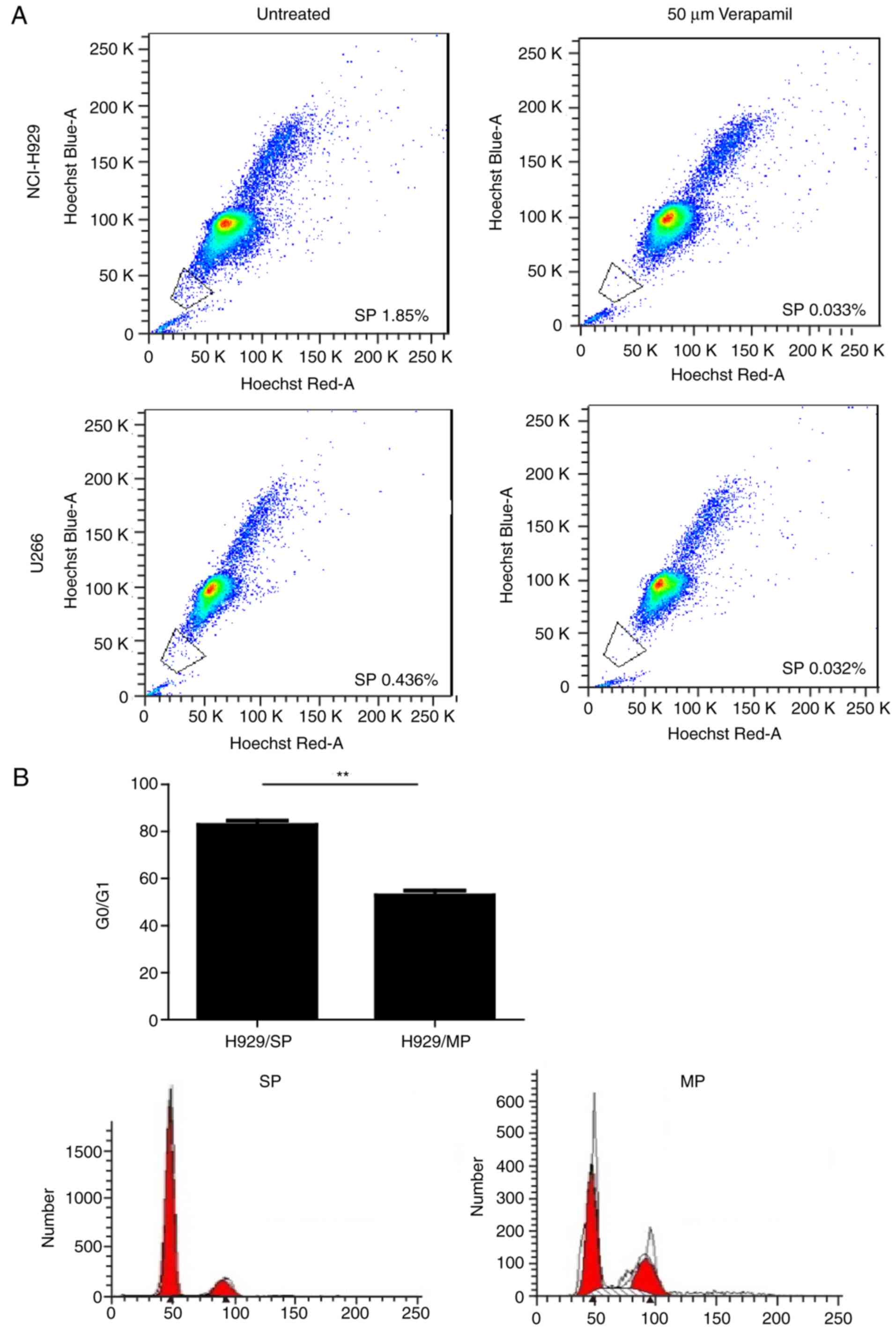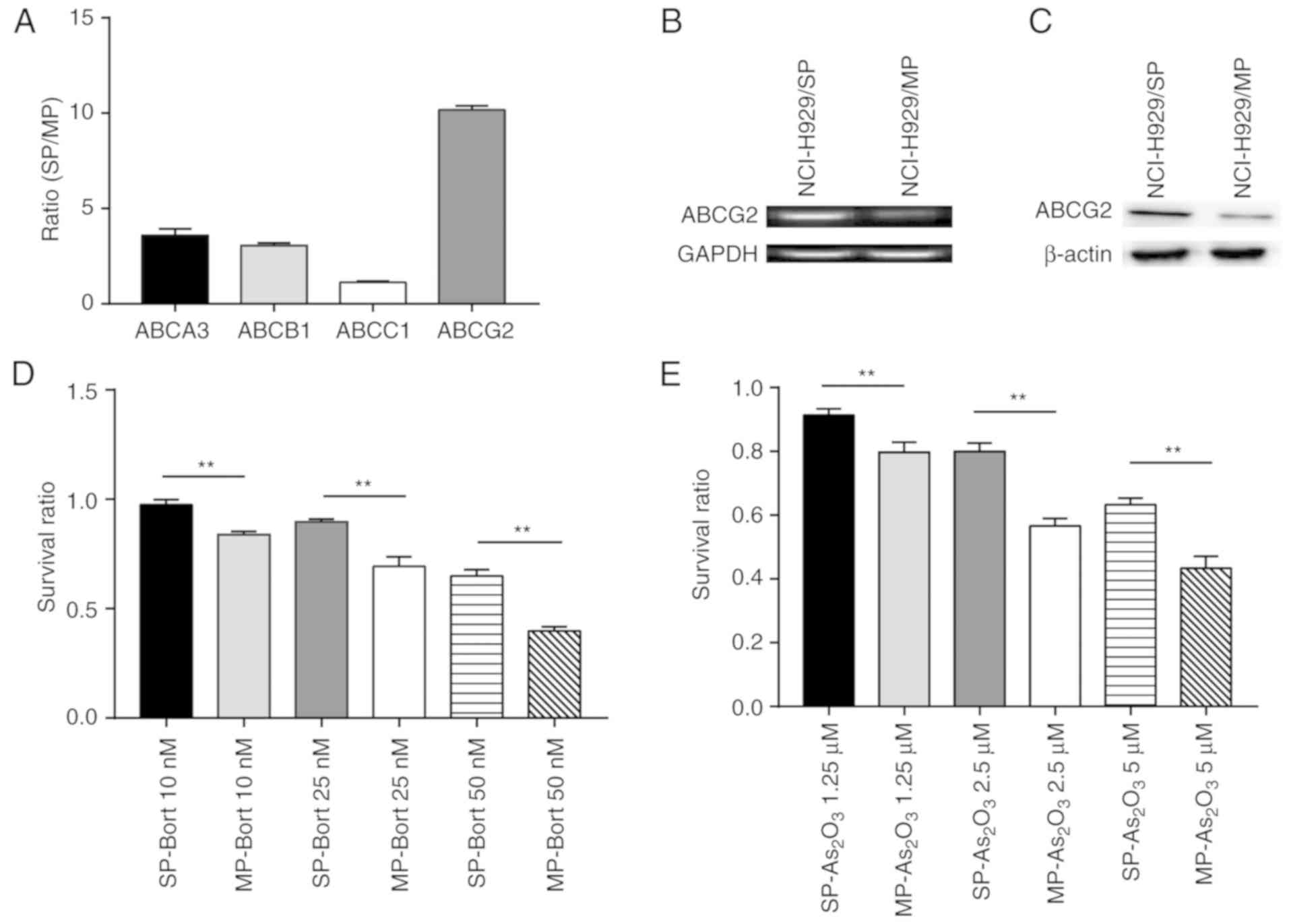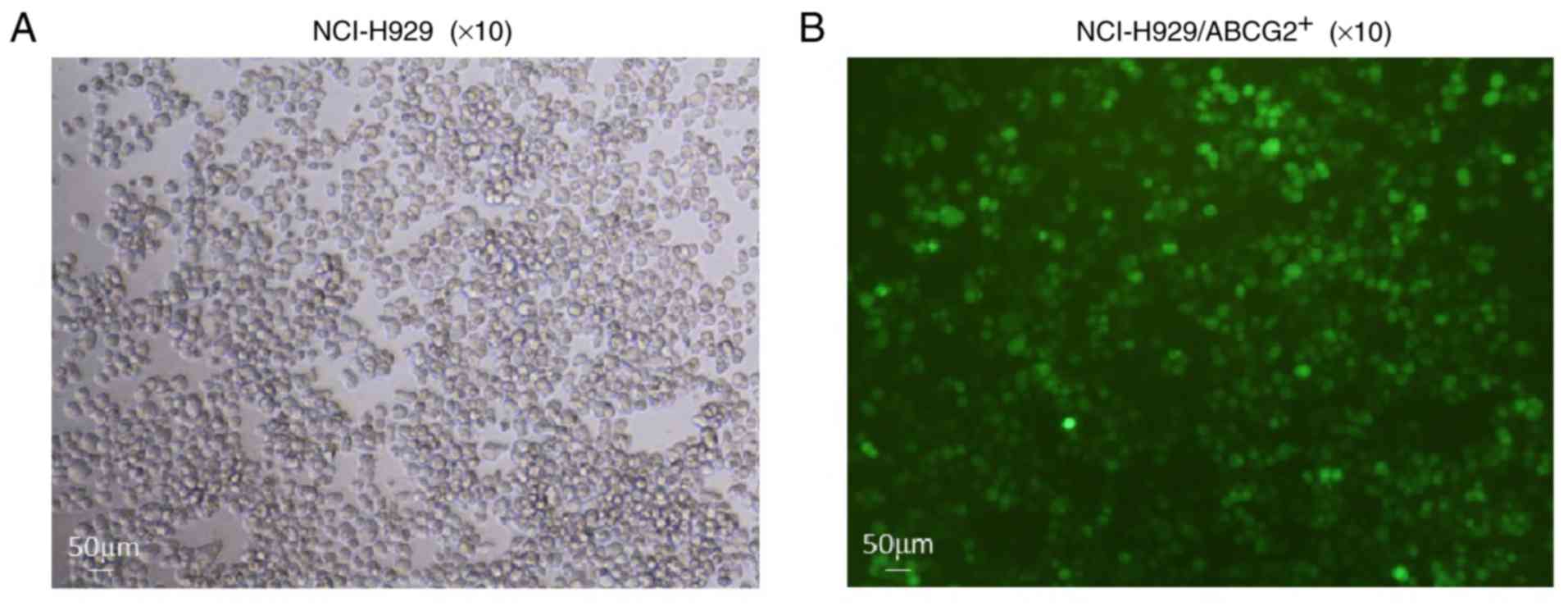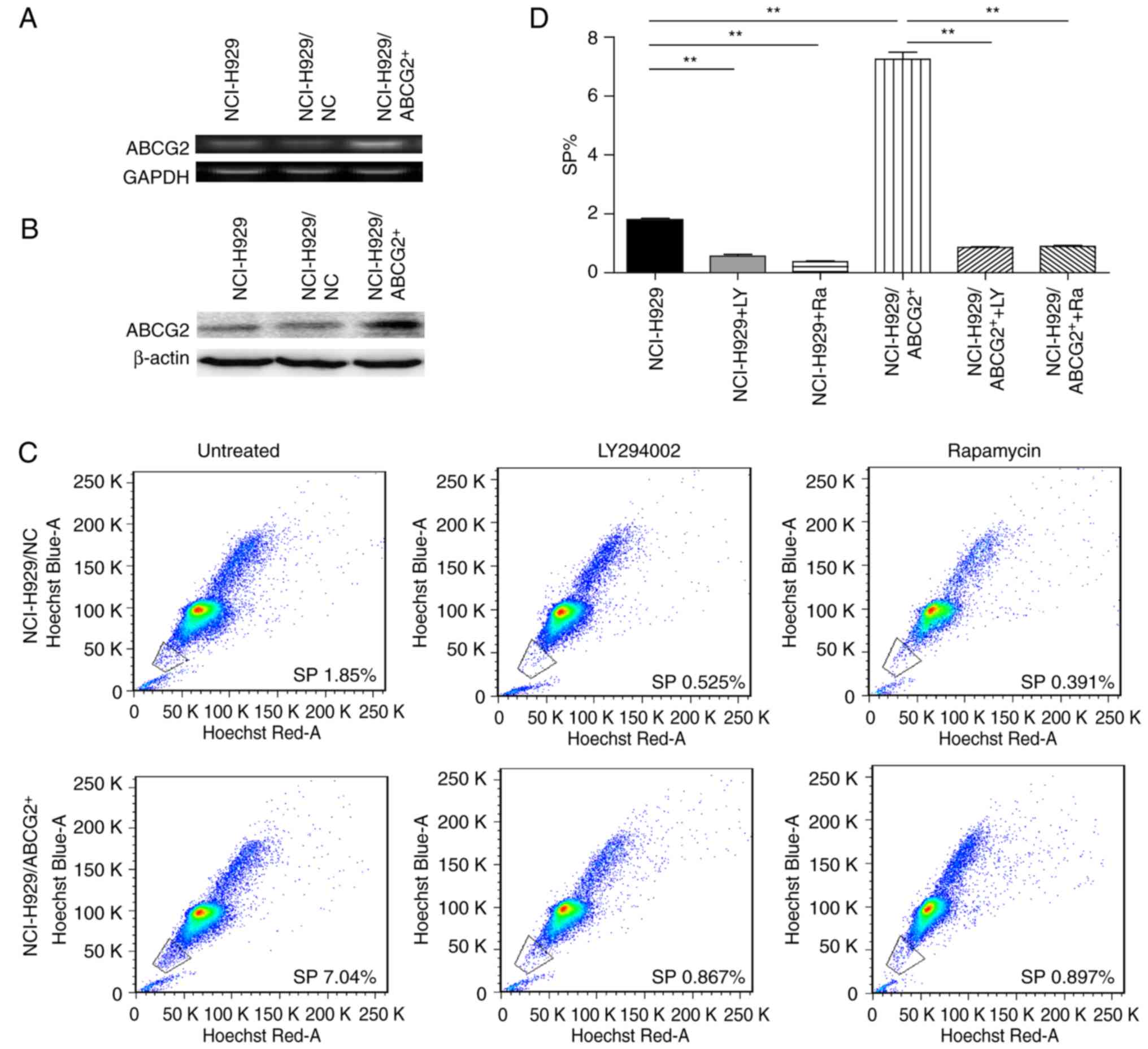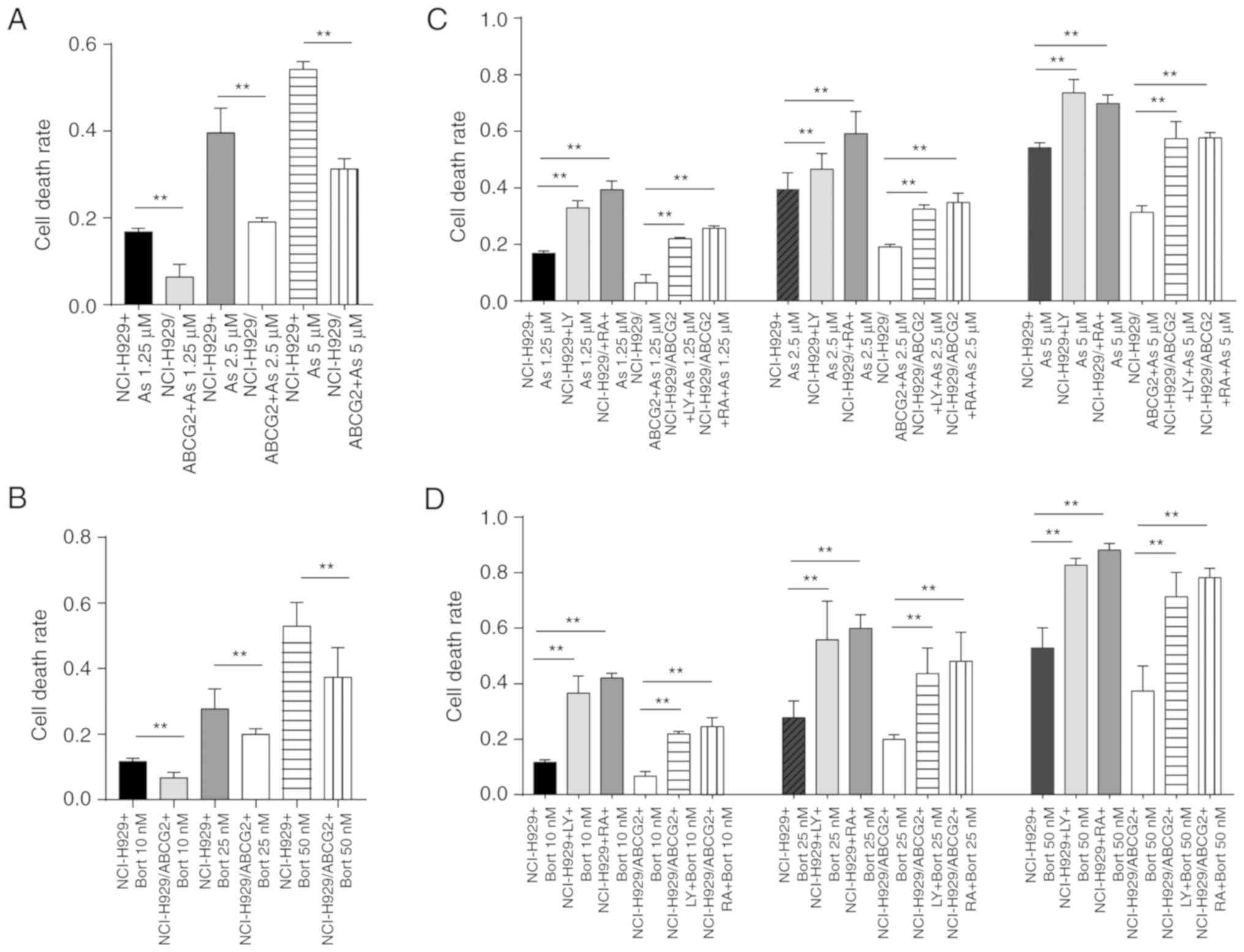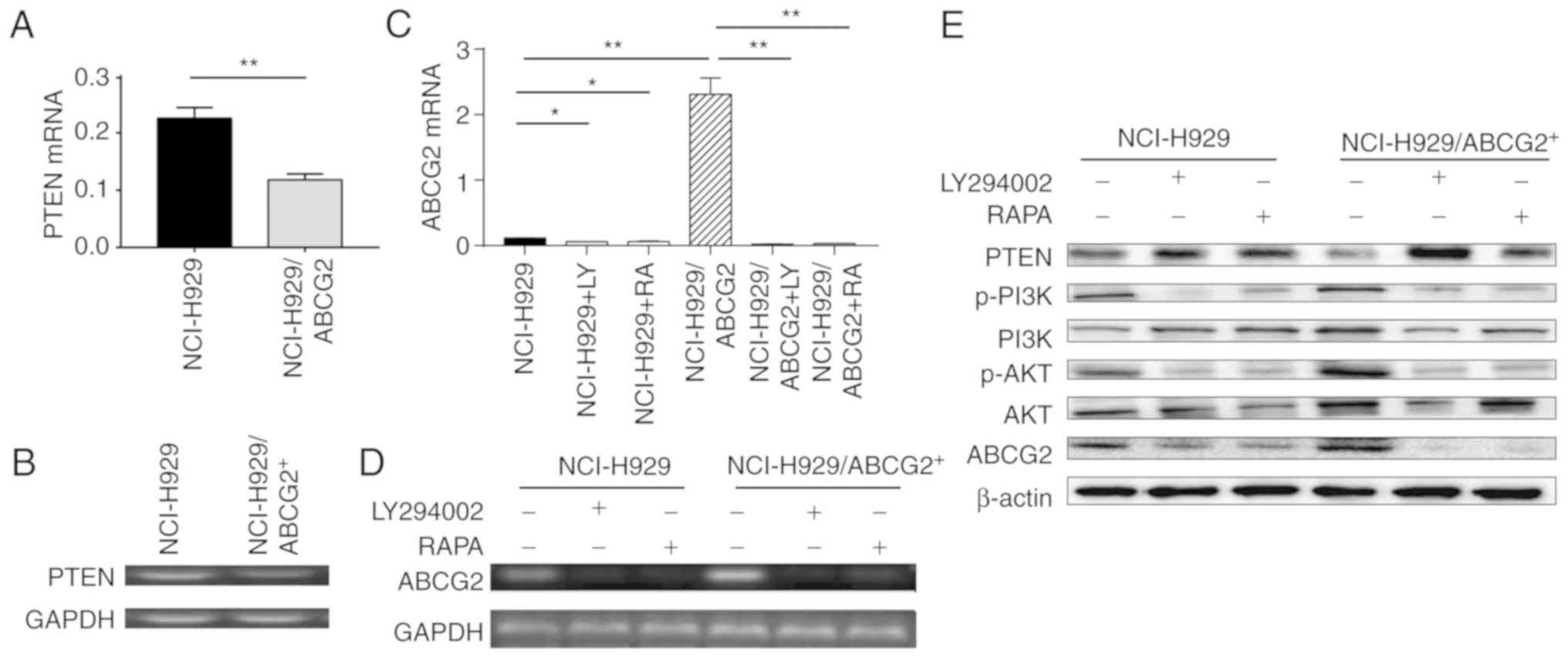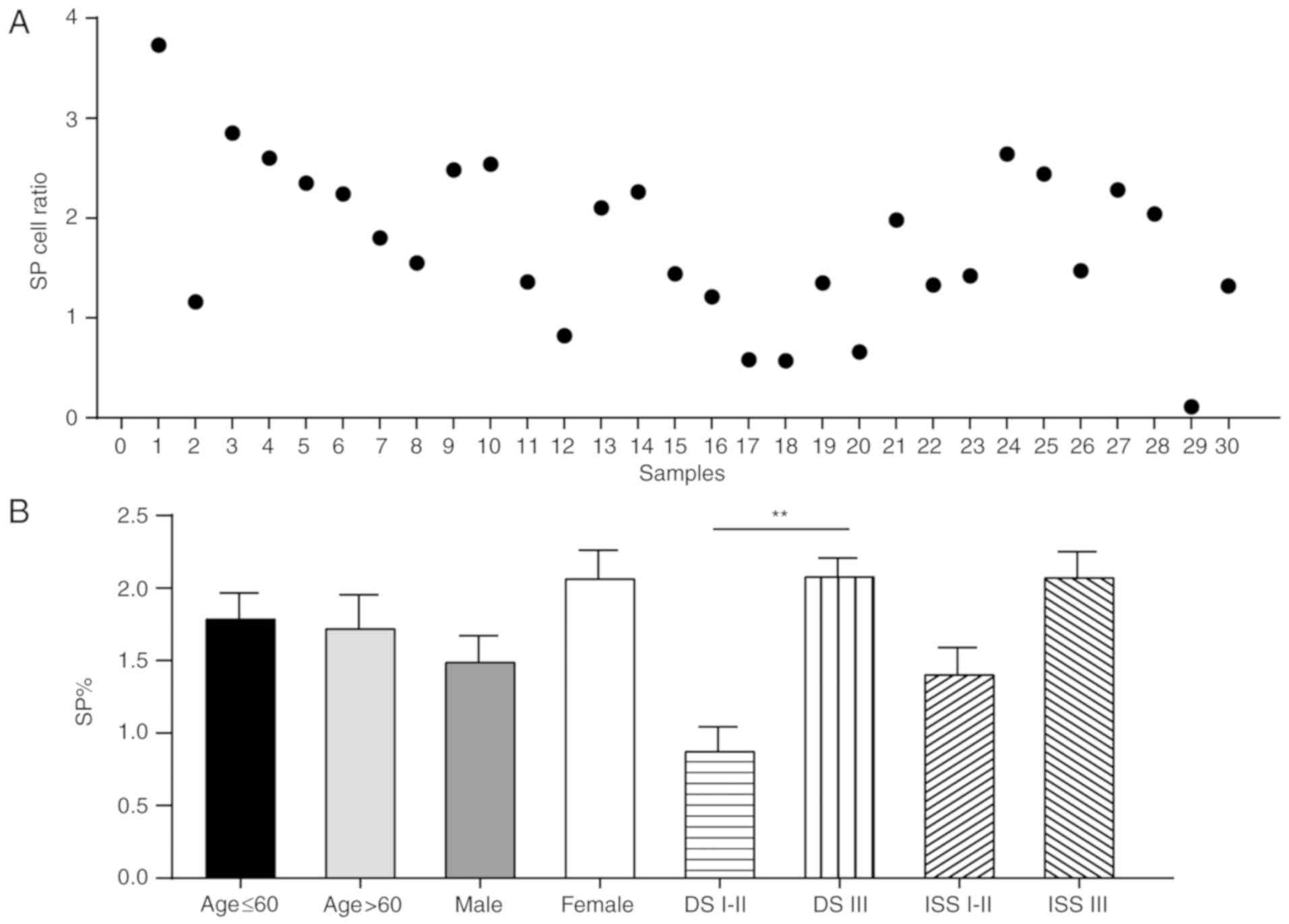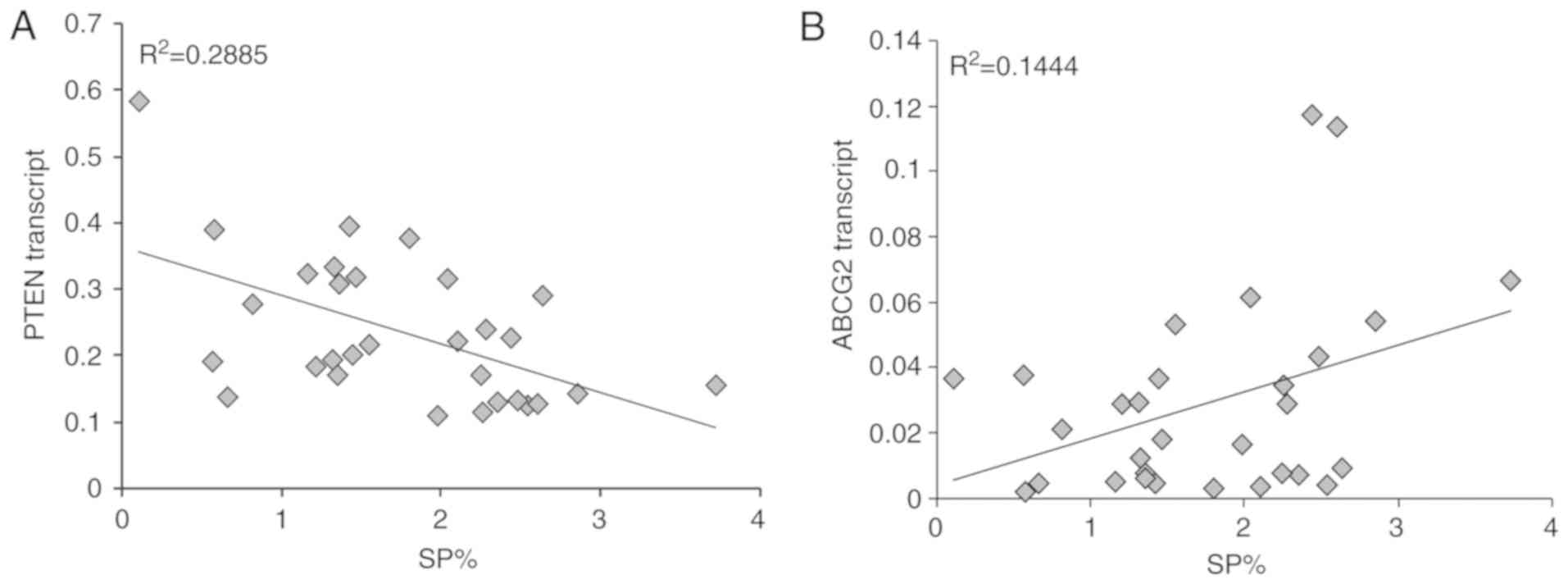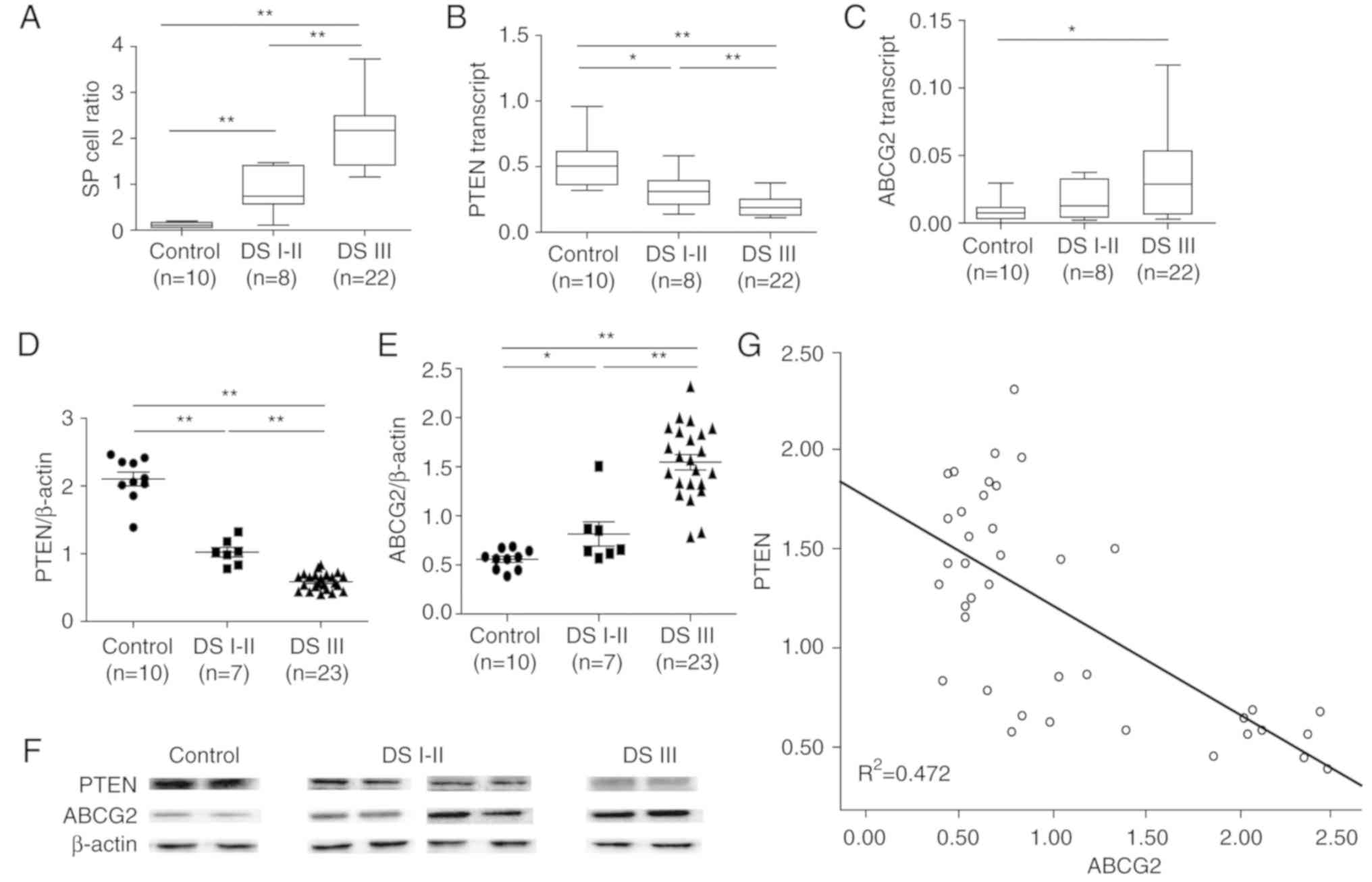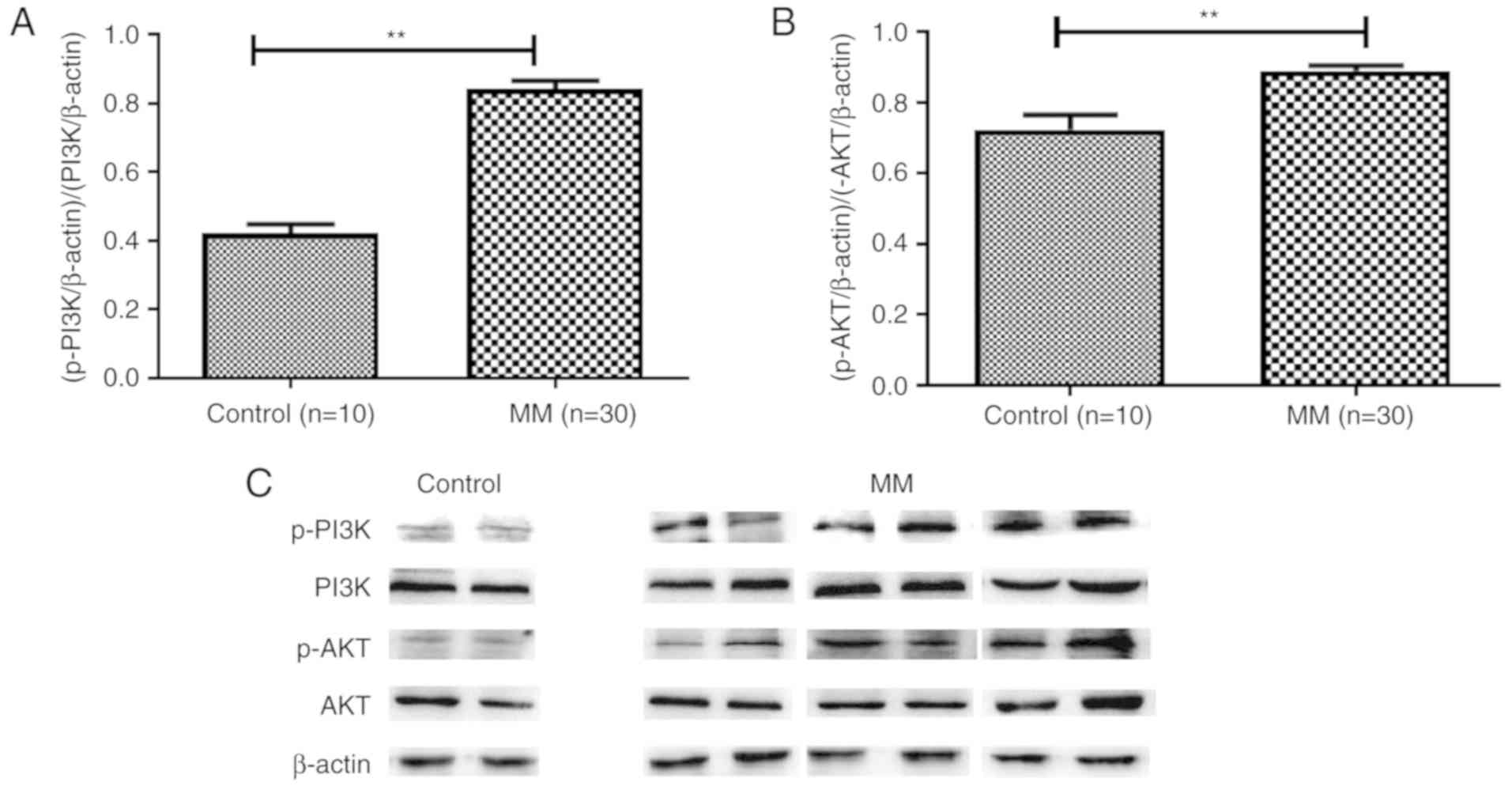|
1
|
Nikesitch N, Lee JM, Ling S and Roberts
TL: Endoplasmic reticulum stress in the development of multiple
myeloma and drug resistance. Clin Transl Immunol. 7:e10072018.
View Article : Google Scholar
|
|
2
|
Issa ME, Cretton S and Cuendet M:
Targeting multiple myeloma cancer stem cells with natural
products-lessons from other hematological malignancies. Planta Med.
83:752–760. 2017. View Article : Google Scholar : PubMed/NCBI
|
|
3
|
Bonnet D and Dick JE: Human acute myeloid
leukemia is organized as a hierarchy that originates from a
primitive hematopoietic cell. Nat Med. 3:730–737. 1997. View Article : Google Scholar : PubMed/NCBI
|
|
4
|
Al-Hajj M, Wicha MS, Benito-Hernandez A,
Morrison SJ and Clarke MF: Prospective identification of
tumorigenic breast cancer cells. Proc Natl Acad Sci USA.
100:3983–3988. 2003. View Article : Google Scholar : PubMed/NCBI
|
|
5
|
Clarke RB, Anderson E, Howell A and Potten
CS: Regulation of human breast epithelial stem cells. Cell Prolif.
1:45–58. 2003. View Article : Google Scholar
|
|
6
|
Dai Y, Liu S, Zhang WQ, Yang YL, Hang P,
Wang H, Cheng L, Hsu PC, Wang YC, Xu Z, et al: YAP1 regulates ABCG2
and cancer cell side population in human lung cancer cells.
Oncotarget. 8:4096–4109. 2017.PubMed/NCBI
|
|
7
|
Prasanphanich AF, White DE, Gran MA and
Kemp ML: Kinetic modeling of ABCG2 transporter heterogeneity: A
quantitative, single-cell analysis of the side population assay.
PLoS Comput Biol. 12:e10051882016. View Article : Google Scholar : PubMed/NCBI
|
|
8
|
Wei Z, Liu Y, Wang Y, Zhang Y, Luo Q, Man
X, Wei F and Yu X: Downregulation of Foxo3 and TRIM31 by miR-551b
in side population promotes cell proliferation, invasion, and drug
resistance of ovarian cancer. Med Oncol. 33:1262016. View Article : Google Scholar : PubMed/NCBI
|
|
9
|
Jiang Y, Gao H, Liu M and Mao Q: Sorting
and biological characteristics analysis for side population cells
in human primary hepatocellular carcinoma. Am J Cancer Res.
6:1890–1905. 2016.PubMed/NCBI
|
|
10
|
Gu H, Wu XY, Fan RT, Wang X, Guo YZ and
Wang R: Side population cells from long-term passage non-small cell
lung cancer cells display loss of cancer stem cell-like properties
and chemoradioresistance. Oncol Lett. 12:2886–2893. 2016.
View Article : Google Scholar : PubMed/NCBI
|
|
11
|
Liu H, Shi B, Yan Y, Niu L, Zhou Y, Cai H
and Ge G: CXCR4 promotes growth and sphere formation of hypoxic
breast cancer side 7 population cells via activation of c-Jun/ABCG2
pathway. Oncol Res. 2016. View Article : Google Scholar :
|
|
12
|
Wei Z, Lv S, Wang Y, Sun M, Chi G, Guo J,
Song P, Fu X, Zhang S and Li Y: Biological characteristics of side
population cells in a self-established human ovarian cancer cell
line. Oncol Lett. 12:41–48. 2016. View Article : Google Scholar : PubMed/NCBI
|
|
13
|
Goodell MA, Brose K, Paradis G, Conner AS
and Mulligan RC: Isolation and functional properties of murine
hematopoietic stem cells that are replicating in vivo. J Exp Med.
183:1797–1806. 1996. View Article : Google Scholar : PubMed/NCBI
|
|
14
|
Haraguchi N, Utsunomiya T, Inoue H, Tanaka
F, Mimori K, Barnard GF and Mori M: Characterization of a side
population of cancer cells from human gastrointestinal system. Stem
Cells. 24:506–513. 2006. View Article : Google Scholar : PubMed/NCBI
|
|
15
|
Hirschmann-Jax C, Foster AE, Wulf GG,
Nuchtern JG, Jax TW, Gobel U, Goodell MA and Brenner MK: A distinct
‘side population’ of cells with high drug efflux capacity in human
tumor cells. Proc Natl Acad Sci USA. 101:14228–14233. 2004.
View Article : Google Scholar : PubMed/NCBI
|
|
16
|
Wang J, Guo LP, Chen LZ, Zeng YX and Lu
SH: Identification of cancer stem cell-like side population cells
in human nasopharyngeal carcinoma cell line. Cancer Res.
67:3716–3724. 2007. View Article : Google Scholar : PubMed/NCBI
|
|
17
|
Huang D, Gao Q, Guo L, Zhang C, Jiang W,
Li H, Wang J, Han X, Shi Y and Lu SH: Isolation and identification
of cancer stem-like cells in esophageal carcinoma cell lines. Stem
Cells Dev. 18:465–473. 2009. View Article : Google Scholar : PubMed/NCBI
|
|
18
|
Bleau AM, Hambardzumyan D, Ozawa T,
Fomchenko EI, Huse JT, Brennan CW and Holland EC: PTEN/PI3K/Akt
pathway regulates the side population phenotype and ABCG2 activity
in glioma tumor stem-like cells. Cell Stem Cell. 4:226–235. 2009.
View Article : Google Scholar : PubMed/NCBI
|
|
19
|
Li H, Gao Q, Guo L and Lu SH: The
PTEN/PI3K/Akt pathway regulates stem-like cells in primary
esophageal carcinoma cells. Cancer Biol Ther. 11:950–958. 2011.
View Article : Google Scholar : PubMed/NCBI
|
|
20
|
Chang FW, Fan HC, Liu JM, Fan TP, Jing J,
Yang CL and Hsu RJ: Estrogen enhances the expression of the
multidrug transporter gene ABCG2-Increasing drug resistance
of breast cancer cells through estrogen receptors. Int J Mol Sci.
18:E1632017. View Article : Google Scholar : PubMed/NCBI
|
|
21
|
Stacy AE, Jansson PJ and Richardson DR:
Molecular pharmacology of ABCG2 and its role in chemoresistance.
Mol Pharmacol. 84:655–669. 2013. View Article : Google Scholar : PubMed/NCBI
|
|
22
|
Fischer B, Frei C, Moura U, Stahel R and
Felley-Bosco E: Inhibition of phosphoinositide-3 kinase pathway
down regulates ABCG2 function and sensitizes malignant pleural
mesothelioma to chemotherapy. Lung Cancer. 78:23–29. 2012.
View Article : Google Scholar : PubMed/NCBI
|
|
23
|
Gao T, Mei Y, Sun H, Nie Z, Liu X and Wang
S: The association of phosphatase and tensin homolog (PTEN)
deletion and prostate cancer risk: A meta-analysis. Biomed
Pharmacother. 83:114–121. 2016. View Article : Google Scholar : PubMed/NCBI
|
|
24
|
Wu H, Dai X and Wang E: Plumbagin inhibits
cell proliferation and promotes apoptosis in multiple myeloma cells
through inhibition of the PI3K/Akt-mTOR pathway. Oncol Lett.
12:3614–3618. 2016. View Article : Google Scholar : PubMed/NCBI
|
|
25
|
Rajkumar SV: Updated diagnostic criteria
and staging system for multiple myeloma. Am Soc Clin Oncol Educ
Book. 35:e418–e423. 2016. View Article : Google Scholar : PubMed/NCBI
|
|
26
|
Huang FF, Wu DS, Zhang L, Yu YH, Yuan XY,
Li WJ, Chen XP, Zhao XL, Chen FP and Zeng H: Inactivation of PTEN
increases ABCG2 expression and the side population through the
PI3K/Akt pathway in adult acute leukemia. Cancer Lett. 336:96–105.
2013. View Article : Google Scholar : PubMed/NCBI
|
|
27
|
Borowicz S, Van Scoyk M, Avasarala S,
Karuppusamy Rathinam MK, Tauler J, Bikkavilli RK and Winn RA: The
soft agar colony formation assay. J Vis Exp. e519982014.PubMed/NCBI
|
|
28
|
Livak KJ and Schmittgen TD: Analysis of
relative gene expression data using real-time quantitative PCR and
the 2ΔΔCT method. Methods. 25:402–408. 2001.
View Article : Google Scholar : PubMed/NCBI
|
|
29
|
Sajadian S, Vatankhah M, Majdzadeh M,
Kouhsari SM, Ghahremani MH and Ostad SN: Cell cycle arrest and
apoptogenic properties of opium alkaloids noscapine and papaverine
on breast cancer stem cells. Toxicol Mech Methods. 25:388–395.
2015. View Article : Google Scholar : PubMed/NCBI
|
|
30
|
Jakubikova J, Adamia S, Kost-Alimova M,
Klippel S, Cervi D, Daley JF, Cholujova D, Kong SY, Leiba M, Blotta
S, et al: Lenalidomide targets clonogenic side population in
multiple myeloma: Pathophysiologic and clinical implications.
Blood. 117:4409–4419. 2011. View Article : Google Scholar : PubMed/NCBI
|
|
31
|
Zhou S, Schuetz JD, Bunting KD, Colapietro
AM, Sampath J, Morris JJ, Lagutina I, Grosveld GC, Osawa M,
Nakauchi H, et al: The ABC transporter Bcrp1/ABCG2 is expressed in
a wide variety of stem cells and is a molecular determinant of the
side-population phenotype. Nat Med. 7:1028–1034. 2001. View Article : Google Scholar : PubMed/NCBI
|
|
32
|
Kellner J, Liu B, Kang Y and Li Z: Fact or
fiction-Identifying the elusive multiple myeloma stem cell. J
Hematol Oncol. 6:912013. View Article : Google Scholar : PubMed/NCBI
|
|
33
|
Guzel E, Karatas OF, Duz MB, Solak M,
Ittmann M and Ozen M: Differential expression of stem cell markers
and ABCG2 in recurrent prostate cancer. Prostate. 74:1498–1505.
2014. View Article : Google Scholar : PubMed/NCBI
|
|
34
|
Sabnis NG, Miller A, Titus MA and Huss WJ:
The efflux transporter ABCG2 maintains prostate stem cells. Mol
Cancer Res. 15:128–140. 2017. View Article : Google Scholar : PubMed/NCBI
|
|
35
|
Wang H, Luo F, Zhu Z, Xu Z, Huang X, Ma R,
He H, Zhu Y, Shao K and Zhao J: ABCG2 is a potential prognostic
marker of overall survival in patients with clear cell renal cell
carcinoma. BMC Cancer. 17:2222017. View Article : Google Scholar : PubMed/NCBI
|
|
36
|
Singh S, Bora-Singhal N, Kroeger J, Laklai
H and Chellappan SP: βArrestin-1 and Mcl-1 modulate self-renewal
growth of cancer stem-like side-population cells in non-small cell
lung cancer. PLoS One. 8:e559822013. View Article : Google Scholar : PubMed/NCBI
|
|
37
|
Zhao R, Liu X, Wang Y, Jie X, Qin R, Qin
W, Zhang M, Tai H, Yang C, Li L, et al: Integrated glycomic
analysis of ovarian cancer side population cells. Clin Proteomics.
13:322016. View Article : Google Scholar : PubMed/NCBI
|
|
38
|
Murota Y, Tabu K and Taga T: Requirement
of ABC transporter inhibition and Hoechst 33342 dye deprivation for
the assessment of side population-defined C6 glioma stem cell
metabolism using fluorescent probes. BMC Cancer. 16:8472016.
View Article : Google Scholar : PubMed/NCBI
|
|
39
|
Yan W, Du J, Du Y, Pu H, Liu S, He J,
Zhang J and Hou J: Fenretinide targets the side population in
myeloma cell line NCI-H929 and potentiates the efficacy of
antimyeloma with bortezomib and dexamethasone regimen. Leuk Res.
51:32–40. 2016. View Article : Google Scholar : PubMed/NCBI
|
|
40
|
Wang Y, Yin C, Feng L, Ma L, Wei Y and
Sheng G: Sorting, identification and enrichment of side population
cells in THP-1 acute monocytic leukemia cells. Oncol Rep.
29:1923–1931. 2013. View Article : Google Scholar : PubMed/NCBI
|
|
41
|
Loh YS, Mo S, Brown RD, Yamagishi T, Yang
S, Joshua DE, Roufogalis BD and Sze DM: Presence of hoechst low
side populations in multiple myeloma. Leuk Lymphoma. 49:1813–1816.
2008. View Article : Google Scholar : PubMed/NCBI
|















